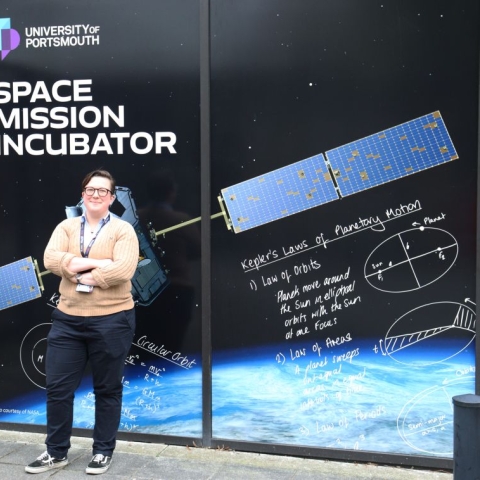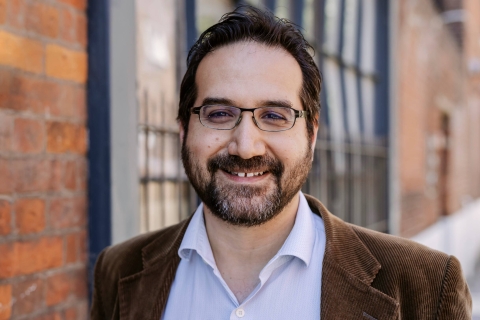

The European Space Agency’s space telescope is scheduled to launch on 1 July
27 June 2023
6 min read
Nearly 20 years ago, a University of Portsmouth Professor and a small group of his peers, launched an idea for a space telescope, which would study two of the universe’s greatest mysteries - dark matter and dark energy.
This weekend, Professor Adam Amara will see that idea come to fruition as Europe’s newest space telescope, Euclid, blasts off on a SpaceX Falcon 9 rocket.
Professor Amara, Director of the University’s Institute of Cosmology and Gravitation (ICG), was one of the first people to propose the idea for a telescope 18 years ago, which has now become Euclid. He was involved in the design and specification at the very beginning and is pleased he’ll finally get to see it launch.
He said: “There's a part of me that can't believe this is actually happening. In 2005, a tiny group of us launched this idea. Now almost 20 years later, close to 3,000 people have worked together to make this dream a reality. The next phase, where we actually measure the universe, is going to be incredibly exciting. Who knows what new discoveries await us?”
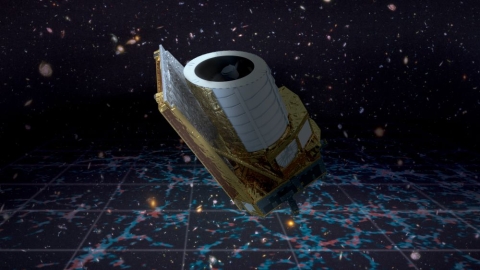
Artist's impression of the Euclid mission in space. © ESA/Euclid/Euclid Consortium/NASA. Background galaxies: NASA, ESA, and S. Beckwith (STScI) and the HUDF Team, CC BY-SA 3.0 IGO
Euclid is a European Space Agency (ESA) six-year mission to map the dark universe, using the positions of galaxies and images of dark matter produced from the gravitational lensing distortions of distant galaxies.
The galaxy and dark matter maps contain information about the expansion history of the universe and the evolution of the structure within it. By analysing these maps, astronomers will be able to determine the nature of both dark matter and dark energy.
Dark matter, which unlike normal matter does not reflect or emit light, binds together galaxies creating the environment for stars, planets and life, while dark energy is the mysterious new phenomenon which is pushing galaxies away from each other and causing the expansion of the universe to accelerate.
After launch, Euclid will travel over one million miles into space away from the Sun, where the combined gravity of the Sun and Earth will cause it to orbit the Sun once a year, in step with the Earth. It will scan the sky and send many petabytes of data back to ESA’s ground stations.
A petabyte is equal to 1,000 terabytes, the equivalent to 500 billion pages of standard printed text.
There's a part of me that can't believe this is actually happening. In 2005, a tiny group of us launched this idea. Now almost 20 years later, close to 3,000 people have worked together to make this dream a reality. The next phase, where we actually measure the universe, is going to be incredibly exciting. Who knows what new discoveries await us?
Professor Adam Amara, Director of the University’s Institute of Cosmology and Gravitation
A team of academics from the ICG have spent years working on Euclid’s software, which will help the telescope achieve its goal of mapping over one billion galaxies
Dr Christopher Pattison, Research Software Engineer, said: “The team at Portsmouth has written code that will help analyse the data that comes off the telescope. The goal of the telescope is to map as many galaxies as we can possibly see in the universe and once we have that data, we need to be able to run statistical tests. For example, how many galaxies there are, and how they are distributed throughout the universe.
“My role has been to validate the code for Euclid, which means I’m part of the ‘quality control’ ensuring that when the telescope launches, our parts of the code work as they should.
“Euclid is an exciting mission to be part of because it’s so ambitious - we’re going to be looking at the universe on a very large scale with a telescope that will survey over one third of the night sky. This is a space telescope that is going to teach us about two of the largest mysteries in modern cosmology - dark matter and dark energy - and having a mission with the potential to unlock these phenomena is very exciting.”
Euclid will be mapping galaxies at a wide range of distances, which means it’s also mapping galaxies of different ages. Its goal is to search for subtle patterns in the distribution of galaxies.
The Portsmouth team is led by Ernest Rutherford Fellow, Dr Seshadri Nadathur, who has been working on coordinating the University’s Euclid work within the wider European team.
He said: “Galaxies are not randomly scattered around the sky – instead there are patterns in their positions that are relics of correlations created at the time of the Big Bang, shaped over billions of years by the interplay of gravity pulling galaxies together and the expansion of the universe driving them apart.
“By measuring and understanding these patterns in the maps Euclid will provide, we will learn about the mysterious force of dark energy that seems to be driving the universe to expand ever faster.”
Chris Pattison talks about the launch of Euclid
Euclid launches from Cape Canaveral in Florida at 4:12pm BST on Saturday 1 July. It is named after the ancient Greek founder of the field of geometry.
Senior Research Software Engineer, Dr Coleman Krawczyk, and Research Software Engineer Dr Samantha Youles have also been working on the mission.
Dr Nadathur added: The team has been busy developing and testing software that builds the maps and allows them to correct for any spurious patterns in the galaxy positions that arise purely due to variations in the performance of the telescope and instruments, so that we can isolate the true cosmological patterns we are interested in.
“It’s not everyday we see the launch of a telescope that we’ve been so involved in, so it’s great to finally see it happen. We can’t wait to see Euclid taking flight and starting to do some amazing science!”
The University of Portsmouth’s work on Euclid has been part of a major coordinated UK programme funded by the UK Space Agency (UKSA).
As well as aiming to answer some of science's most fundamental questions about the nature of the universe, Euclid is set to revolutionise studies across all of astronomy, providing a lasting legacy database for professional astronomers and the public to explore. To find out more, visit: https://eucliduk.github.io/
You might also like...
Astrophysicist receives Civic Award for her outstanding contribution to the local community
26 June 2023
3 minutes
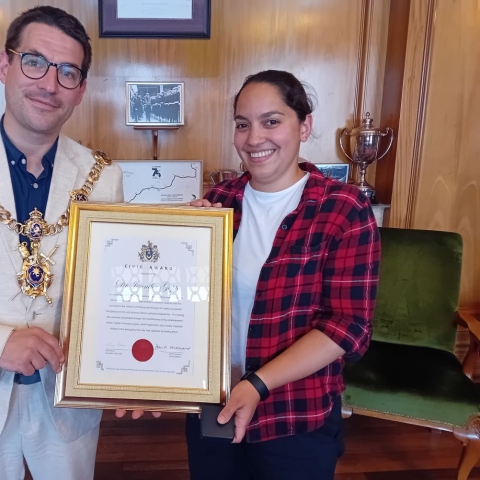
Rare gravitational lens splits light of distant supernova into four images
An international team of physicists and astronomers, including University of Portsmouth researchers, has made an intriguing breakthrough in our ability to explore how galaxies warp the surrounding space with the discovery of a multiply-imaged lensed Type Ia supernova, dubbed “SN Zwicky”.
13 June 2023
6 min read
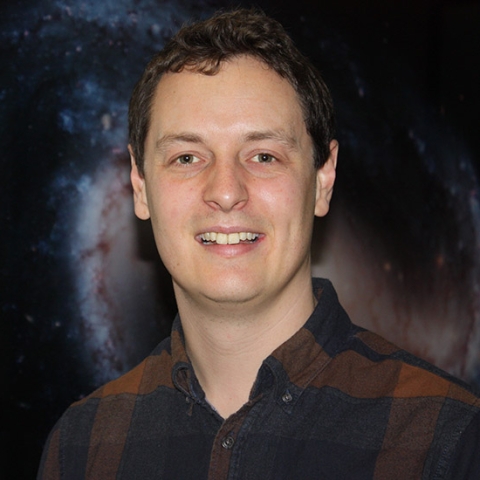
NASA-inspired space mission design facility awarded £100k
A unique new mission design service, inspired by NASA JPL, has won £100k funding from the UK Space Agency for its set-up phase at the University of Portsmouth.
7 June 2023
5 min read
